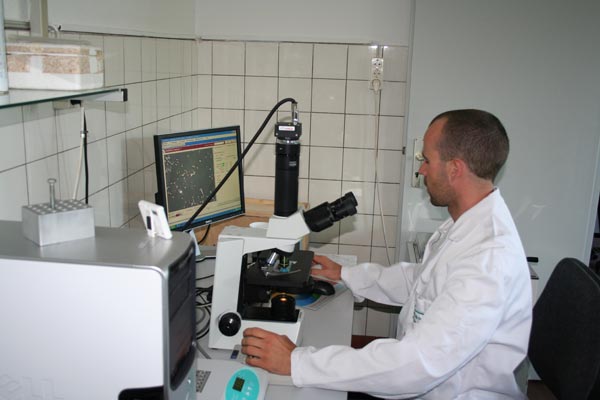It does not always need to be antibiotics: healthy pig breeding

Cationic synthetic peptides: assessment of their antimicrobial potency in liquid preserved boar semen. Photo: IFN Schoenow e.V.
Researchers investigated the application of antimicrobial peptides (AMP) as substitutes for antibiotics in liquid sperm preservation. Firstly they were able to show that AMPs fight bacteria effectively in test tubes.
Then they showed that two of the investigated AMPs suppressed bacterial growth in liquid preserved semen preparations if combined with a small amount of the antibiotic “gentamicin”. The sperm quality was not impeded by this addition.
Bacteria are extremely adaptable which can lead to an increasing resistance against antibiotics. This causes big problems for breeders when using artificial insemination, the method most commonly used in assisted reproductive technology in pig production worldwide.
Freshly retrieved boar ejaculates always contain bacteria. These germs are detrimental to the quality as well as the longevity of liquid preserved sperm, with dire, negative consequences for fertility. The addition of antibiotics to liquid semen is required by law and facilitates an inhibition of bacterial growth.
However, many types of bacteria quickly develop resistances to the usually applied antibiotics. Hence it is important to look for new antimicrobial alternatives.
Scientists from the German Leibniz Institute for Zoo and Wildlife Research (IZW) investigated the effect of antimicrobial peptides in cooperation with the Leibniz Institute of Molecular Pharmacology (FMP) and the Institute for Reproduction of Farm Animals Schoenow e.V. (IFN).
These molecules are naturally occurring amino acid compounds, are toxic for bacteria and can be found in nearly all organisms as a first defence against germs. For this study, synthetic cationic antimicrobial peptides were produced.
“Antimicrobial peptides do not offer a complete alternative for traditional antibiotics in liquid sperm preservation, but allow a substantial reduction in their concentration”, explains Dr Karin Müller from the IZW. “This is a benefit for people as well, as the occurrence of resistance will be reduced if fewer antibiotics are used.”
Additional application possibilities are conceivable, outlines Dr Margitta Dathe from the FMP. “Antimicrobial peptides could be used for the preservation of other cells as well. Furthermore special AMPs for the treatment of superficial infections could be developed.”
Publication:
Speck S, Courtiol A, Junkes C, Dathe M, Mueller K, Schulze M (2014): Cationic synthetic peptides: assessment of their antimicrobial potency in liquid preserved boar semen. PLOS ONE
Previous publication:
Schulze M, Junkes C, Mueller P, Speck S, Ruediger K, Dathe M, Mueller K (2014): Effects of cationic antimicrobial peptides on liquid-preserved boar spermatozoa. PLOS ONE 9(6): e100490. doi: 10.1371/journal.pone.0100490
Contact:
Dr. Karin Müller
Tel.: +49 30 5168-125
mueller@izw-berlin.de
Dr. Margitta Dathe
Tel.: +49 30 947 93 274
dathe@fmp-berlin.de
Steven Seet
(Press Officer)
Tel.: +49 30 5168-125
seet@izw-berlin.de
Background information:
The Leibniz Institute for Zoo and Wildlife Research (IZW) investigates the vitality and adaptability of wildlife populations in mammalian and avian species of outstanding ecological interest that face anthropogenic challenges. It studies the adaptive value of traits in the life cycle of wildlife, wildlife diseases and clarifies the biological basis and development of methods for the protection of threatened species. Such knowledge is a precondition for a scientifically based approach to conservation and for the development of concepts for the ecologically sustainable use of natural resources. The IZW belongs to the Forschungsverbund Berlin e.V. (www.fv-berlin.de)
www.izw-berlin.de
http://www.izw-berlin.de
http://www.fmp-berlin.de
http://www.ifn-schoenow.de
Media Contact
All latest news from the category: Agricultural and Forestry Science
Newest articles

Largest magnetic anisotropy of a molecule measured at BESSY II
At the Berlin synchrotron radiation source BESSY II, the largest magnetic anisotropy of a single molecule ever measured experimentally has been determined. The larger this anisotropy is, the better a…

Breaking boundaries: Researchers isolate quantum coherence in classical light systems
LSU quantum researchers uncover hidden quantum behaviors within classical light, which could make quantum technologies robust. Understanding the boundary between classical and quantum physics has long been a central question…

MRI-first strategy for prostate cancer detection proves to be safe
Active monitoring is a sufficiently safe option when prostate MRI findings are negative. There are several strategies for the early detection of prostate cancer. The first step is often a…



